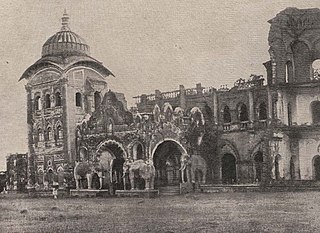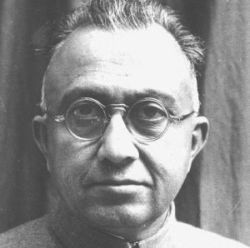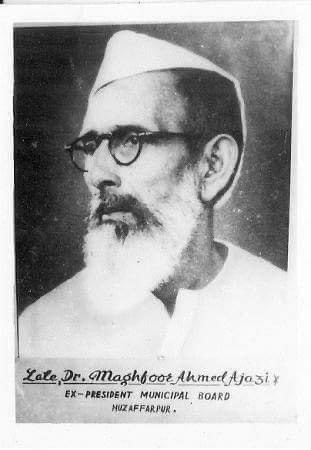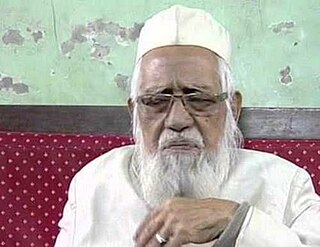Related Research Articles

Ram Vilas Paswan was an Indian politician from Bihar and the Cabinet Minister of Consumer Affairs, Food and Public Distribution in the first and second Modi ministries. Paswan was also the president of the Lok Janshakti Party, nine-times Lok Sabha member and two-time Rajya Sabha MP. He started his political career as member of Samyukta Socialist Party and was elected to the Bihar Legislative Assembly in 1969. Later, Paswan joined Lok Dal upon its formation in 1974, and became its general secretary. He opposed the emergency, and was arrested during this period. He first entered the Lok Sabha in 1977, as a Janata Party member from Hajipur constituency, and was elected again in 1980, 1989, 1991, 1996, 1998, 1999, 2004 and 2014.

Tirhut Division or Tirhut Commissionary is an administrative-geographical unit of Bihar in India. Muzaffarpur is the headquarters of the division. It comprises six districts: Muzaffarpur, West Champaran, East Champaran, Vaishali, Sitamarhi and Sheohar.

Sushil Kumar Modi was an Indian politician from the Bharatiya Janata Party who was a Member of Parliament in the Rajya Sabha from Bihar. He was a Deputy Chief Minister of Bihar as well as the Finance Minister of Bihar from 2005 to 2013 and 2017 to 2020. He was a lifelong member of the Rashtriya Swayamsevak Sangh. He was appointed the Chairman of the Empowered Committee of State Finance Ministers for the Implementation of Goods and Service Tax in July 2011. He was posthumously honored with the Padma Bhushan, India's third-highest civilian award, by the Government of India.

Mahatma Gandhi Kashi Vidyapith is a public university located in Varanasi, Uttar Pradesh, India. Established on 10 February 1921 as Kashi Vidyapith and later renamed, it is administered under the state legislature of the government of Uttar Pradesh. It got University status in 1974 as Deemed to be University and State University status in 2009 by The Uttar Pradesh State Universities (Amendment) Act, 2008. The university has more than 400+ affiliated colleges spread over six districts. It is one of the largest state universities in Uttar Pradesh, with hundreds of thousands of students, both rural and urban. It offers a range of professional and academic courses in arts, science, commerce, agriculture science, law, computing and management.
Goraul is a community development block in Vaishali district in the state of Bihar, India.

Bhojpur District is one of the 38 districts of the Indian state of Bihar. Arrah city is the administrative headquarters of this district. Bhojpur district came into existence in 1972. Earlier it was the part of Shahabad district. This district is named "Bhojpur" after great Parmara King Bhoja as most early settlers were Rajput rulers of Parmara dynasty then called as Ujjainiya.

Bihar Government is the state government of the Indian state of Bihar and its nine divisions which consist of districts. It consists of an executive, led by the Governor of Bihar, a judiciary and legislative branches.

The Garhwali people are an Indian ethnolinguistic group native to the Garhwal, in the Indian state of Uttarakhand, who speak Garhwali, an Indo-Aryan language.

The 1934 Nepal–India earthquake or 1934 Bihar–Nepal earthquake was one of the worst earthquakes in India's history. The towns of Munger and Muzaffarpur were completely destroyed. This 8.0 magnitude earthquake occurred on 15 January 1934 at around 2:13 pm IST and caused widespread damage in northern Bihar and in Nepal.

Thakur Ramapati Singh, was a freedom fighter, politician, MLA and Minister of Bihar, Member of Indian Parliament and a prominent social personality from Motihari, Bihar in India.

Hukmdev Narayan Yadav is a politician from Bihar, who has been Union Minister of Cabinet Textile and Food Processing. He is the recipient of Padma Bhushan India's third highest civilian award. He represented the Madhubani constituency of Bihar in 1977, 1999, 2009, 2014 and 1989 from Sitamarhi Lok Sabha constituency. He was with Socialist Party in 1960s and various faces of Janata Dal and its off-shoots in 1980s, but later he joined Bharatiya Janata Party. Yadav is known for his fiery speeches in the parliament. In August 2018, Yadav was recipient of Outstanding Parliamentarian Award for 2014-2017 period and was felicitated at an event at the central hall of Parliament.

Benegal Shiva Rao was an Indian journalist and politician. He was a member of the Constituent Assembly of India and an elected representative of the South Kanara constituency in the First Lok Sabha. He was the correspondent of The Hindu and then of the Manchester Guardian. He was also a member of the Rajya Sabha from 1957 - 1960 and a recipient of the civilian honour of the Padma Bhushan.

Maghfoor Ahmad Ajazi was a political activist from Bihar, prominent in the Indian independence movement.

Ram Lakhan Singh Yadav, known with the honorific "Sher-e-Bihar", also known as Ramlakhan Babu, was an Indian freedom fighter, educationist, social reformer and politician. The half a century long political journey of Ramlakhan Babu, which started in post-independence era as a member of the Zilla Parishad in 1947, reached the pinnacle of becoming a Union Minister in the Central Government in 1994.He was elected to the 10th Lok Sabha, lower house of the Parliament of India from the Arrah, Bihar in 1991 as a member of the Janata Dal but joined the Congress in controversial circumstances which helped save Narasimha Rao Government in the 28 July 1993 no confidence vote. He was the Minister for Chemicals and Fertilizers in the Narasimha Rao Government.

Chandradeo Prasad Verma was a politician who was elected to the Lok Sabha, the lower house of Parliament of India from the Arrah, Bihar in 1977, 1980 and 1996. He was the Union Minister of State for Rural Areas and Employment. He was earlier Member of the Bihar Legislative Assembly and a Cabinet minister in Bihar.

Shashi Bhushan (1924–2011) was an Indian independence activist, social worker, politician, writer and an institution builder. He was the founder of several organisations such as Rashtriya Ekta Samiti, All India Freedom Fighters' Organisation, Punjab Ekta Samiti and the Institute for Socialist Education, and represented Khargone and South Delhi constituency in the 5th Lok Sabha (1971–1977).

Syed Mohammad Sharfuddin Quadri was an Indian independence activist, Gandhian and a physician of the Unani system of medicine. He accompanied Gandhiji in the Salt March of 1930 and was a prison mate of the Indian leader when they were incarcerated by the British regime at Cuttack jail. He was the founder of a medical magazine, Hikmat-e-Bangala and was among the group of people who founded the Calcutta Unani Medical College and Hospital. The Government of India awarded him the third highest civilian honour of the Padma Bhushan, in 2007, for his contributions to Indian medicine.
Shyam Nandan Sahay CIE was an Indian landlord, educationist, legislator and the founder vice chancellor of Babasaheb Bhimrao Ambedkar Bihar University. Born in the Indian state of Bihar, he also served as the vice chancellor of Patna University. He was a member of the 1st Lok Sabha, elected from Muzaffarpur Central constituency on Indian National Congress candidature. He won from Muzaffarpur again in 1957 but died in the same year. The Government of India awarded him the third highest civilian honour of the Padma Bhushan, in 1957, for his contributions to education. A road in Muzaffarpur is named after him.
Prajapati Mishra was an Indian politician from the state of Bihar.
References
- 1 2 G. C. Malhotra (2004). Cabinet Responsibility to Legislature: Motions of Confidence and No-confidence in Lok Sabha and State Legislatures. Lok Sabha Secretariat. ISBN 978-81-200-0400-9. Archived from the original on 13 July 2021. Retrieved 14 October 2016.
- ↑ "RJD MLA faces the music for fodder scam slogan — The Times of India". Timesofindia.indiatimes.com. Times News Network. 10 December 2011. Archived from the original on 25 September 2022. Retrieved 5 October 2015.
- ↑ "Padma Bhushan Awardees — Padma Awards — My India, My Pride — Know India: National Portal of India". Archive.india.gov.in. 9 December 2012. Archived from the original on 5 October 2015. Retrieved 5 October 2015.
- ↑ Singh, Major Kulbir (1 July 2017). "Maghfoor Ahmad Ajazi: Political activist from Bihar". youngbites.com. Archived from the original on 8 February 2022. Retrieved 24 February 2022.